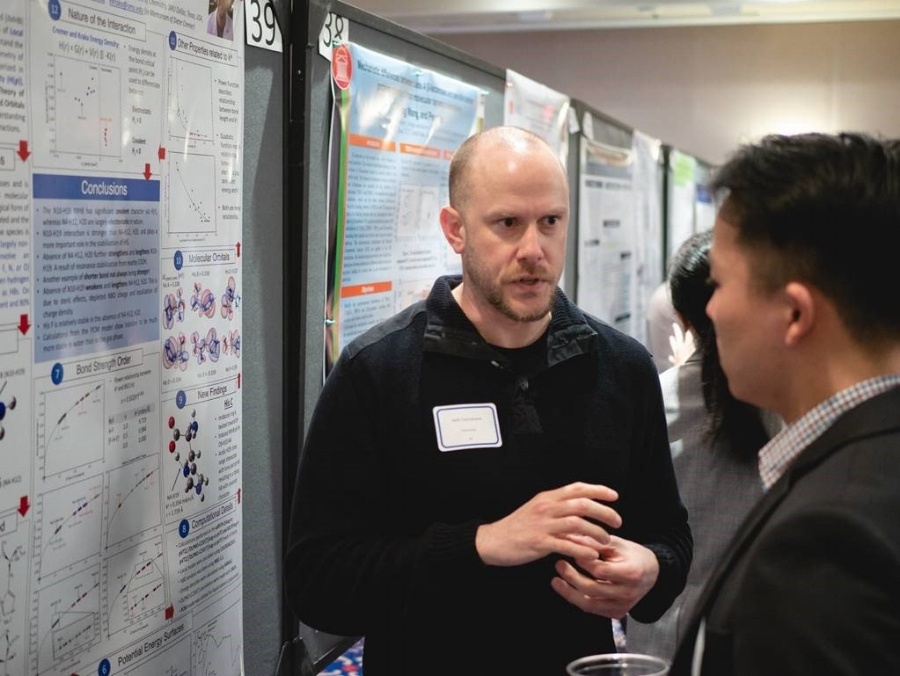
Based on an interview with first-year SMU graduate student, Seth Yannacone. His remarks have been lightly edited for clarity.
The road to a graduate degree program in Theoretical and Computational Chemistry (TCC) can take many forms. Many applicants spend some time after their undergraduate degree working in science-related fields before they decide to pursue a PhD in Chemistry However, some applicants carry the momentum of their undergraduate studies straight into a PhD program.
Seth Yannacone is one of those students. Originally from Denver, Colorado, Seth spent his undergraduate years at the Metropolitan State University of Denver (MSU) where he received a Bachelor’s degree in Chemistry with a Minor in Mathematics.
Seth knew he was interested in chemistry from his years in high school, but wasn’t initially sure what he would study in college:
I became interested in chemistry in high school when I took my first chemistry course. I found it dangerous, exciting, and fascinating. It wasn’t until after high school when I was reflecting on where my natural skills and interests are that I began to realize maybe I could become a chemist.
His interest in chemistry continued to grow in college where he did research related to optimizing renewable energy synthetic methods, investigating potential biofuel additives for lowering cloud points and increasing the long-term viability of ‘green’ energy sources.
Making the Graduate School Decision
Despite his passion for the subject, Seth still wasn’t sure what he would do after college. When he received an email from Southern Methodist University (SMU) about its Theoretical and Computational Chemistry PhD program, he explored the CATCO website and was intrigued:
I explored the CATCO website and quickly gained the impression that they offered rigorous training. I was specifically attracted by the small class sizes and individual attention and instruction I would receive. I also loved the city and the campus.
Initially, Seth hesitated. Did he have what it takes to become a computational chemist? He knew that he had a strong theoretical background from his undergraduate degree, but he knew nothing about computational chemistry. Also, would this degree translate to the career options that he wanted?
Seth talks about he overcame these hesitations:
I was able to overcome the first concern when I realized that TCC is something that really interests me.
Theoretical chemistry is a valuable field to study because almost everything we know about chemistry started as theory. Without theoreticians, scientific development would slow to a crawl. Experiments could still be carried out but without any theories, we would struggle to explain results. Computation is important because such studies are highly efficient. Computational studies can help guide physical experiments, thus saving a lot of time and resources. Many of the sciences are moving more and more into the computational realm, and I predict that trend to continue indefinitely.
Many fields in the physical sciences are seeing an increased demand for theoretical and computational chemists. Additionally, I am developing skills that will allow me to cross over into computer science fields if I so desire.
Life in the Program
Now in his first year in SMU’s TCC PhD program, Seth has already tackled some innovative research projects.
My first projects involved transition state (TS) theory. I investigated a series of 30 reactions (intramolecular H-migration, H-substitution, and cycloaddition) by isolating the TS in each reaction and analyzing bond strength in terms of reaction/activation energy and adiabatic local mode force constants (local modes). The overarching goal is to probe for a relationship between activation energy and local modes.
My latest project involves investigating the role of intra-molecular hydrogen bonds in stabilizing neutral histidine. We also wish to explain the stability of several histidine rotamers and conformers in terms of local modes.
He is also enjoying the close-knit community of TCC students and professors.
The TCC program is preparing me for my future by teaching me how to conduct quality research, produce professional publications, and present my work to the scientific community.
I most appreciate the individual attention I am benefitting from. All of my professors, mentors, and colleagues are very accessible. I also appreciate the opportunity to work in a new field and the strong possibility of much of my work being published.
Perhaps the most important development in Seth’s story is that he has grown in confidence that he can succeed both in graduate school and in the field of Theoretical and Computational Chemistry specifically:
I have told myself and proven to myself that I can achieve anything I am willing to dedicate 100% to, and after successfully completing one semester, I am more confident that I can do this.
Facing the Challenge
Taking on the challenge of an intensive, research-focused Chemistry PhD program can be daunting. As you consider your own journey toward graduate study in the field of chemistry, be encouraged by the lessons that Seth and many others have learned along the way:
- Your passion, interest, and dedication can take you far
- The skills you learn in graduate school can translate to a successful career in several types of fields
- Small class sizes and opportunities for individual mentoring give you the support you need
- Opportunities to do innovative and exciting research will keep you engaged and learning

